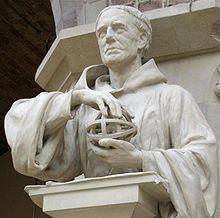
Back Roger Bacon ALS روجر باكون Arabic روجر بيكون ARZ Rocer Bekon Azerbaijani Роджэр Бэкан Byelorussian Роджър Бейкън Bulgarian রজার বেকন Bengali/Bangla Roger Bacon Catalan Roger Bacon Czech Roger Bacon Welsh
Roger Bacon | |
|---|---|
 Statue of Bacon at the Oxford University Museum of Natural History | |
| Born | c. 1219/20 Near Ilchester, Somerset, England |
| Died | c. 1292[1][2] (aged about 72/73) Near Oxford, Oxfordshire, England |
| Nationality (legal) | English |
| Other names | Doctor Mirabilis |
| Alma mater | University of Oxford |
| Era | Medieval philosophy |
| Region | Western philosophy |
| School | Scholasticism |
Main interests | Theology Natural philosophy |
Notable ideas | Experimental science |
Roger Bacon OFM (/ˈbeɪkən/;[3] Latin: Rogerus or Rogerius Baconus, Baconis, also Frater Rogerus; c. 1219/20 – c. 1292), also known by the scholastic accolade Doctor Mirabilis, was a medieval English philosopher and Franciscan friar who placed considerable emphasis on the study of nature through empiricism. In the early modern era, he was regarded as a wizard and particularly famed for the story of his mechanical or necromantic brazen head. He is sometimes credited (mainly since the 19th century) as one of the earliest European advocates of the modern scientific method, along with his teacher Robert Grosseteste. Bacon applied the empirical method of Ibn al-Haytham (Alhazen) to observations in texts attributed to Aristotle. Bacon discovered the importance of empirical testing when the results he obtained were different from those that would have been predicted by Aristotle.[4][5]
His linguistic work has been heralded for its early exposition of a universal grammar, and 21st-century re-evaluations emphasise that Bacon was essentially a medieval thinker, with much of his "experimental" knowledge obtained from books in the scholastic tradition.[6] He was, however, partially responsible for a revision of the medieval university curriculum, which saw the addition of optics to the traditional quadrivium.[7]
Bacon's major work, the Opus Majus, was sent to Pope Clement IV in Rome in 1267 upon the pope's request. Although gunpowder was first invented and described in China, Bacon was the first in Europe to record its formula.
- ^ Encyclopædia Britannica (1878), p. 220.
- ^ Oxford Dictionary of National Biography (2004).
- ^ "Bacon" Archived 15 June 2018 at the Wayback Machine entry in Collins English Dictionary.
- ^ Ackerman (1978), p. 119.
- ^ "Who is Roger Bacon?". Archived from the original on 7 September 2021. Retrieved 16 October 2019.
- ^ MSTM (2005).
- ^ Stanford Encyclopedia of Philosophy (2013), §1.
© MMXXIII Rich X Search. We shall prevail. All rights reserved. Rich X Search